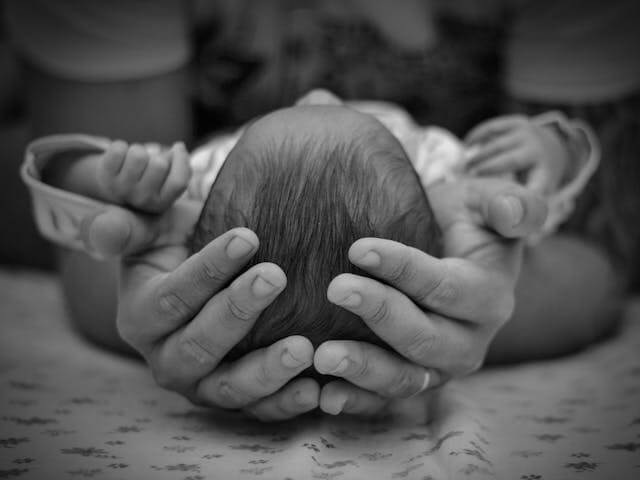When we talk about postpartum, our cultural lens almost always focuses on mothers, and for good reason. The physical recovery, hormonal changes, and emotional upheaval after birth can be overwhelming. Mothers deserve and need a strong web of support.
But right alongside mom is a partner, often a dad, whose life has just transformed, too. While he may not have carried the baby or endured labor, he’s navigating his own major identity shift, pressures, and emotional adjustments. For many men, the postpartum period brings a quiet, persistent loneliness.
It’s not the “I’m bored” kind of loneliness. It’s the kind where you can be holding your new baby, sitting next to your partner, surrounded by family, and still feel completely unseen.
Why a Father’s Loneliness Goes Unnoticed
When the baby arrives, the household’s focus narrows to one priority: keeping that tiny human alive and thriving. That tunnel vision is necessary, but it can leave dads in a strange in-between space.
They may not want to “burden” their partner with their own feelings. They may feel guilty for struggling when mom is still physically recovering. And because societal narratives often cast dads as the steady, unshakable one, many decide their role is to “man up” and push through.
In my clinical work as a Gottman-trained therapist, I often draw from the Bringing Baby Home principles developed by Drs. John and Julie Gottman to help couples protect their emotional connection during the transition to parenthood. These principles emphasize something I hear repeatedly from men:
- “I didn’t think my feelings mattered as much right now.”
- “I felt like an extra in my own life.”
- “Everyone kept asking how my wife was doing, and no one asked about me.”
Without acknowledgement, men can quietly withdraw, self-isolating, feeling inadequate, and losing connection to their partner and themselves.
The Compounding Factors
Several forces converge to make this loneliness particularly intense for new fathers:
- Loss of old identity – Overnight, hobbies, social time, and routines are replaced with diaper changes, sleepless nights, and baby care.
- Shifting relationships – The couple dynamic changes drastically; intimacy, both emotional and physical, often takes a back seat.
- Work pressure – Many dads feel the need to “provide,” returning to work before they’ve emotionally processed the life change.
- Social invisibility – Most postpartum resources are designed for mothers, leaving dads unsure where to turn.
What Loneliness Can Look Like
Postpartum loneliness in men isn’t always obvious. It can show up as:
- Irritability or quick temper
- Increased drinking or numbing behaviors
- Restlessness or dissatisfaction
- Avoidance of home life or overworking
- Feeling disconnected from the baby or partner
These are often mistaken for “just being tired,” but they can be signs of a deeper need for connection and support.
What Helps: Practical Steps
For Dads:
- Name what you’re feeling: “I’m feeling disconnected” can be a powerful opener.
- Find your outlet: a friend, therapist, or new dad group (online counts).
- Stay connected to your body: walks, workouts, stretching.
- Schedule micro-moments of joy: music, a text to a friend, a solo coffee run.
- Release the “shoulds”: no one has it all together; showing up as you are is enough.
For Partners:
- Ask, don’t assume: “How are you doing?” goes a long way.
- Carve out couple time: even 15 minutes without baby talk helps.
- Share the emotional load: both partners’ feelings matter.
- Celebrate each other: acknowledge small parenting wins.
For Friends & Family:
- Check in with both parents – not just mom.
- Offer specific help: “I can take the baby for an hour so you can get out.”
- Normalize his role: openly acknowledge the challenges dads face.
The Generational Impact
When dads feel supported and connected, the benefits ripple outward. Emotional presence models healthy relationships and communication for children, breaking cycles where men feel they must suppress emotions. By normalizing vulnerability in fathers, we can shift generational patterns, raising children who see both parents as emotionally attuned and engaged.
A Hierarchy of Needs Perspective
Maslow’s hierarchy reminds us that once our basic survival needs are met – food, shelter, safety – we crave belonging, love, and connection. In the postpartum phase, a father’s physiological and safety needs may be in place, but if emotional connection is missing, it leaves a gap that can impact his mental health, relationship satisfaction, and ability to show up fully as a parent. Supporting dads in this stage isn’t “extra”, it’s foundational.
When to Seek Help
If loneliness shifts into persistent sadness, hopelessness, or detachment from the baby or life, it may be postpartum depression. Yes, men can experience it, about 1 in 10 new dads do. It’s treatable with professional help, and therapy, whether individual or couples, can be a safe place to unpack emotions, strengthen communication, and rebuild connection.
The Bigger Picture
Expanding the postpartum conversation to include men’s emotional health benefits everyone: the parents, the baby, and the relationship. Babies thrive when both caregivers feel supported and connected.
It’s not about taking the spotlight from mom; it’s about adding more light to the room so no one is left in the shadows.
If you’re a new dad feeling lonely right now, it doesn’t mean you’re failing. It means you’re human. Parenthood isn’t meant to be a solo act. Just like your baby needs care, so do you. The sooner we normalize that, the healthier our families – and our future generations – will be.
RELATED ARTICLES
- First-Time Fathers, Your Voice Matters
- Gary Rogers-Unlocking the Power of Fatherhood
- Bonding for Dads
ABOUT THE AUTHOR
Erin Meyer, LCPC – Founder of Mindful Healing Works, Gottman-Trained Therapist. Learn more on Instagram at @mindfulhealingworks and @itselevatewitherin.
Cover Photo by Tanaya Sadhukhan

